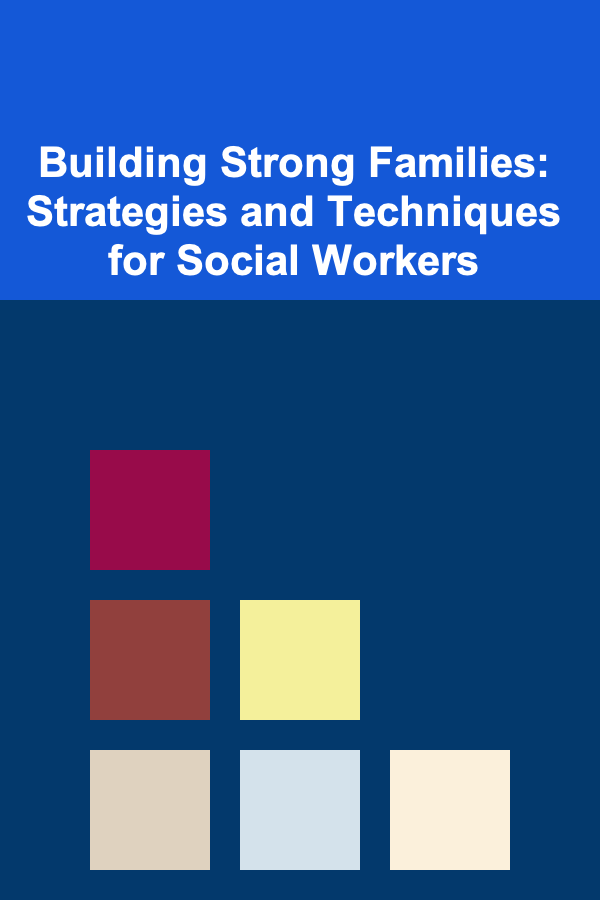
Building Strong Families: Strategies and Techniques for Social Workers
ebook include PDF & Audio bundle (Micro Guide)
$12.99$8.99
Limited Time Offer! Order within the next:

Family is the cornerstone of society. It is within the family unit that individuals learn values, develop emotional and social skills, and receive both physical and emotional support. However, not all families are equipped to handle the challenges that life presents. Social workers play a critical role in supporting families, helping them navigate issues such as poverty, substance abuse, mental health struggles, and domestic violence, among others. By using effective strategies and techniques, social workers can help families build resilience, enhance communication, and create healthy environments for all members.
In this guide, we'll explore actionable strategies and techniques that social workers can use to build stronger families. These practices aim to strengthen familial bonds, promote positive relationships, and foster a sense of unity and support.
Strengthening Communication within Families
Effective communication is the foundation of any healthy relationship, and families are no exception. When communication breaks down, misunderstandings, conflicts, and emotional isolation often follow. Social workers can help families improve communication by teaching them tools and strategies that facilitate honest, respectful dialogue.
Actionable Steps:
- Promote Active Listening: Encourage family members to listen actively to each other. Active listening involves giving full attention to the speaker, acknowledging their feelings, and asking clarifying questions. Social workers can model this behavior during sessions and guide family members on how to apply it in their daily interactions.
- Teach "I" Statements: Often, family members fall into the trap of blaming or criticizing one another, which leads to defensiveness. Encourage the use of "I" statements instead of "you" statements. For example, "I feel hurt when I'm not included in decisions" is less accusatory than "You never include me in decisions."
- Facilitate Family Meetings: Regular family meetings can be an effective way for members to discuss concerns, set goals, and provide mutual support. During these meetings, social workers can help structure discussions, ensuring each family member has an opportunity to speak, and emotions are addressed in a respectful manner.
- Promote Non-Verbal Communication Awareness: Body language, tone, and facial expressions play a significant role in communication. Social workers can teach families to be mindful of these non-verbal cues and ensure they align with the message being communicated.
By equipping families with effective communication strategies, social workers can help reduce conflicts and create an atmosphere of trust and mutual respect.
Encouraging Emotional Support and Empathy
Strong families are built on emotional support and empathy. Family members need to know that they can turn to each other in times of distress, whether it's a challenging day at work or dealing with a personal crisis. Empathy involves understanding and sharing the feelings of another, and social workers can foster this in family units.
Actionable Steps:
- Model Empathetic Behavior: Social workers can demonstrate empathy by listening without judgment, acknowledging emotions, and offering emotional validation. This helps create an environment where family members feel safe expressing their feelings.
- Teach Family Members to Express Emotions Constructively: Encourage family members to express their feelings in ways that promote understanding, rather than alienation. For example, teaching family members to say "I feel sad when I don't feel heard" instead of "You never listen to me" can make a significant difference in how emotions are shared and received.
- Strengthen Emotional Literacy: Many families, especially those from backgrounds with limited emotional education, may struggle to identify and express their emotions. Social workers can offer exercises or activities to help family members expand their emotional vocabulary, which fosters better emotional intelligence within the family unit.
- Promote Acts of Kindness and Appreciation: Encourage families to engage in small acts of kindness or appreciation, like complimenting each other, acknowledging efforts, or simply asking about each other's day. These simple gestures build emotional bonds and help family members feel valued.
Building empathy and emotional support helps create a sense of connection, allowing family members to navigate difficult situations together.
Enhancing Parenting Skills
Parenting can be challenging, and parents often need support to help them navigate the responsibilities and complexities of raising children. Social workers can provide strategies and techniques that foster positive parenting and create a nurturing environment for children to thrive.
Actionable Steps:
- Provide Parenting Education: Many parents benefit from learning effective strategies for discipline, setting boundaries, and encouraging positive behavior. Social workers can organize workshops or one-on-one sessions where parents can learn about age-appropriate discipline techniques, creating routines, and balancing work and family life.
- Foster Positive Reinforcement: Encourage parents to use positive reinforcement to encourage good behavior. This can involve praising children for efforts and accomplishments rather than solely focusing on correcting mistakes. Positive reinforcement helps build self-esteem and encourages children to continue positive behaviors.
- Encourage Consistency in Parenting: Consistency is key in parenting. Social workers can guide parents in developing consistent routines and responses to behavior, helping children feel secure and understand expectations.
- Teach Problem-Solving Skills: Parents and children alike can benefit from learning problem-solving skills. When conflicts arise, it's important to approach them collaboratively. Social workers can teach families how to resolve conflicts by discussing options, weighing the pros and cons, and agreeing on solutions together.
By supporting parents in developing healthy, consistent parenting strategies, social workers help foster positive relationships between parents and children and contribute to a supportive home environment.
Promoting Healthy Family Boundaries
Boundaries are essential in any relationship, including within families. Healthy boundaries ensure that family members respect each other's personal space, needs, and autonomy. When boundaries are not properly established or respected, it can lead to conflicts, resentment, and unhealthy dynamics. Social workers can guide families in setting and maintaining appropriate boundaries.
Actionable Steps:
- Educate Families on Boundary Setting: Social workers can help family members identify what their personal boundaries are---whether physical, emotional, or mental---and how to communicate them effectively. For example, teaching children to say "I need some time alone" or parents to express when they need space can foster mutual respect.
- Encourage Respect for Privacy: Encouraging families to respect each other's privacy is crucial. While close relationships are important, everyone needs some level of personal space. Social workers can help families understand that respecting privacy doesn't mean withdrawing love but is a key component of a healthy relationship.
- Model Healthy Boundaries in Sessions: During family therapy or counseling, social workers can model appropriate boundary-setting and encourage family members to practice these techniques in real-life situations. This might involve teaching them how to say "no" when needed, how to share feelings without being intrusive, or how to respect the privacy of others.
- Create Structured Family Time: Establishing designated family time---such as a weekly family meal, outing, or activity---can help create clear boundaries between individual time and collective time. This strengthens relationships without infringing on personal space.
Maintaining healthy boundaries allows each family member to feel respected and valued, while also encouraging individuality within the family unit.
Building Resilience and Coping Mechanisms
Life is full of challenges, and families inevitably face crises, whether it's a financial struggle, a health issue, or the loss of a loved one. Resilience refers to the ability to bounce back from adversity, and social workers can help families develop resilience by teaching coping strategies and fostering a positive mindset.
Actionable Steps:
- Teach Stress Management Techniques: Social workers can teach families how to manage stress in healthy ways, such as through mindfulness exercises, physical activity, or deep breathing techniques. These tools allow families to handle difficult situations without resorting to unhealthy coping mechanisms.
- Foster a Growth Mindset: Encourage families to view challenges as opportunities for growth rather than insurmountable obstacles. Social workers can help family members reframe negative situations and find meaning or lessons in adversity.
- Promote Problem-Solving and Goal Setting: Helping families set realistic goals and break them into actionable steps can help build resilience. Social workers can guide families in establishing short-term and long-term goals, ensuring that they work toward a brighter future despite current difficulties.
- Support the Family as a Unit: Families should be encouraged to lean on each other for support during times of crisis. Social workers can facilitate discussions on how each family member can offer help and emotional support to others in times of need.
By fostering resilience, social workers help families navigate difficult circumstances with hope and strength, ensuring they remain united and capable of overcoming obstacles together.
Conclusion
Building strong families requires a holistic approach that addresses communication, emotional support, parenting, boundaries, and resilience. Social workers play an integral role in helping families develop these vital skills, ensuring they can navigate life's challenges with strength and unity. Through strategic guidance, empathy, and support, social workers can empower families to create positive, healthy environments where each member thrives. As families grow stronger, they not only improve their individual well-being but also contribute to the greater well-being of society as a whole.
Reading More From Our Other Websites
- [Organization Tip 101] How to Set Up a Custom Closet System on a Budget
- [Organization Tip 101] How to Create a Display Wall for Your Fine Art Collection
- [Home Lighting 101] How to Install and Use Dimmer Switches for Enhanced Home Lighting
- [Home Rental Property 101] How to Make Your Rental Property Pet-Friendly
- [Home Renovating 101] How to Optimize Small Space Design: Make the Most of Every Square Foot
- [Organization Tip 101] Step-by-Step Guide to Installing Carpet Tiles in Your Home
- [Organization Tip 101] How to Use Checklists for Family Events and Outings
- [Survival Kit 101] The Ultimate Survival Kit for Car Campers Crossing the Continental United States
- [Home Budget Decorating 101] How to Refresh Your Bedroom Decor Without Spending a Fortune
- [Digital Decluttering Tip 101] Best Approaches to Streamlining Digital Receipts for Freelancers

How to Make Your Front Door Holiday-Ready with DIY Decorations
Read More
How to Soundproof Your Home for Better Podcasting or Streaming
Read More
How to Tackle Your Home Renovation Project Without Stress
Read More
How to Use Labels to Enhance Volunteer Space Clarity
Read More
How to Leverage Social Media for Profit: A Deep Dive
Read More
How to Integrate Your Vision Insurance with a Budgeting App
Read MoreOther Products

How to Make Your Front Door Holiday-Ready with DIY Decorations
Read More
How to Soundproof Your Home for Better Podcasting or Streaming
Read More
How to Tackle Your Home Renovation Project Without Stress
Read More
How to Use Labels to Enhance Volunteer Space Clarity
Read More
How to Leverage Social Media for Profit: A Deep Dive
Read More